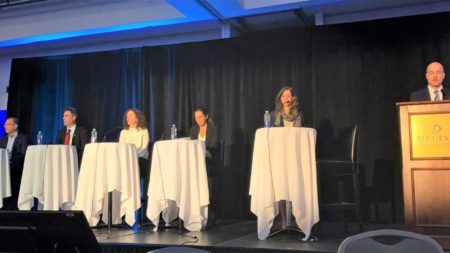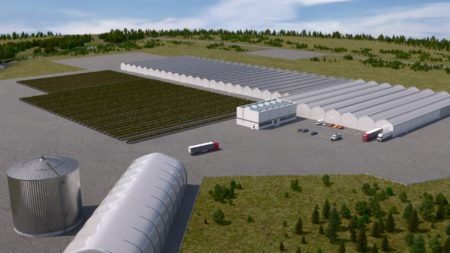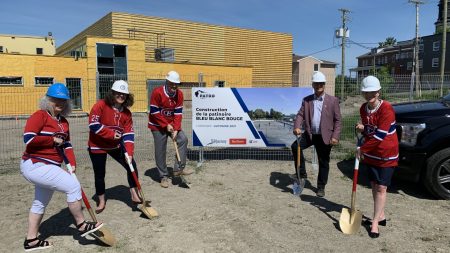Towards More Efficient, Innovative, and Responsible Shipping Operations

Martin Lavoie
Martin Lavoie, Operations Director of Vaudreuil Works, Port Facilities and Railway Services, and Distribution Jonquière (second from the left) spoke to participants during the opening remarks of the workshop on strengthening the economic corridor. He was also one of the panellists at the workshop on decarbonising the supply chain.
On 18 May, 200 stakeholders in Quebec’s shipping industry gathered at the Centre d’événements et de congrès interactifs in Trois-Rivières for the second edition of the Assises québécoises du secteur maritime, a forum on shipping.
The forum, an initiative of the St. Lawrence Economic Development Council (SODES), is designed to further the dialogue between the shipping industry and policymakers so as to align government initiatives with the industry’s needs.
Presentations, speakers, and panels followed one another throughout this enlightening day to paint a picture of the emerging shipping issues that are of interest to the industry’s stakeholders.
Four workshops on key issues gave participants a chance to deepen their knowledge and understanding of the most efficient, innovative, and responsible shipping practices. The workshops dealt with strengthening the economic corridor and decarbonising the supply chain, in addition to addressing occupations of the future, community relations, and social acceptability.
Rio Tinto was one of the event’s main sponsors. Martin Lavoie, Operations Director of Vaudreuil Works, Port Facilities and Railway Services, and Distribution Jonquière, had the opportunity to speak to the participants during the opening remarks of the workshop on strengthening the economic corridor. He was also one of the panellists at the workshop on decarbonising the supply chain.
“With 80% of goods consumed around the world being shipped and passing through a port, the shipping industry is ramping up its carbon reduction efforts and performance,” said Lavoie. “Throughout the supply chain, companies are putting climate first, adopting ambitious targets, and taking specific action. Today, we can no longer think about economic growth without considering the environment and the social acceptability of projects. As a leading charterer, we recognise that we have a meaningful role to play in decarbonising our own shipping and the industry more broadly.”
Lavoie also noted that Rio Tinto has signed the Global Maritime Forum’s Call to Action for Shipping Decarbonisation and is collaborating on the Next Wave Green Corridors study, which suggests ammonia as one of the most promising alternative marine fuels to reduce greenhouse gas emissions within the shipping industry.
“We are closely monitoring technological advances in vessel design to reduce footprints on ecosystems,” Lavoie added. “As the race to zero-emission shipping by 2050 progresses, ammonia continues to emerge as a promising green fuel of the future. Biofuel should also be considered not only for our vessels but also for our tugs.”
Rio Tinto also recently announced that it is investing $1.5 million over five years through the Rio Tinto Aluminium Canada Fund to support the Northern Institute for Research in Environment and Occupational Health and Safety (INREST) in rolling out the Enviro-Actions model in the Saguenay port area. This project will facilitate the acquisition and transfer of knowledge on air and water quality as well as on underwater noise.
“We wish to integrate the delivery of our climate targets in shipping towards maximising the value of our business, providing our customers and partners with sustainable value-chain solutions and products,” said Lavoie.
At the end of the forum, participants reiterated the importance of cultivating great synergy among shipping organisations, as well as the need to better promote the industry and, by the same token, get the new generation interested in considering a career in this promising field.
Of note, Rio Tinto’s La Baie Port Facilities have been certified under the North American Green Marine environmental programme since 2010.


